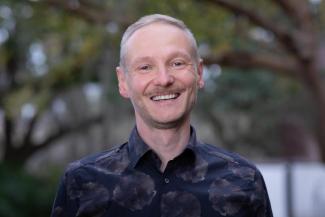Thomas Stephan Juzek

Contact Information
ann. in class, and by appt.
About
Thomas Stephan Juzek (M.A. phonetics, University of Bonn; Ph.D. linguistics, University of Oxford) is an assistant professor of computational linguistics, with a courtesy appointment in Scientific Computing. His research interests include the application of computational methods to linguistic questions, with a current focus on the features of AI-generated language, its impact on human language usage, and the causes that influence model behavior. Prior to joining FSU, Dr Juzek worked in the tech industry for several years. He also co-organizes the SC Artificial Intelligence and Machine Learning Seminar.
In the news: selected coverage includes NPR's Science Friday; The Washington Post; The Daily Telegraph (UK); WIRED (ES); TechRadar; ZDNET; and Newsweek; with further international coverage.
Mentorship: Dr Juzek serves as the advisor for the Computational Linguistics track in FSU's Data Science Program. He mentors several students and has previously supervised students participating in the Undergraduate Research Opportunity Program (UROP). If you have any questions or are interested in researching language and AI, feel free to reach out.
Computational linguistics
Natural language processing
Corpus linguistics
Experimental and information theoretic approaches
- Juzek, T. S., & Ward, Z. B. (2025). Why Does ChatGPT “Delve” So Much? Exploring the Sources of Lexical Overrepresentation in Large Language Models. The Proceedings of the 31st International Conference on Computational Linguistics (COLING 2025). https://aclanthology.org/2025.coling-main.426/
- Juzek, T. S. (2024). Signal Smoothing and Syntactic Choices: A Critical Reflection on the UID Hypothesis. Open Mind, 8, 217-234. Full article.
- Juzek, T. S., Krielke, M. P., & Teich, E. (2020). Exploring diachronic syntactic shifts with dependency length: the case of scientific English. In Proceedings of the Fourth Workshop on Universal Dependencies (UDW 2020) (pp. 109-119). https://aclanthology.org/2020.udw-1.13.pdf
More publications at Google Scholar.
LIN3041: Introduction to linguistics I
LIN3042: Introduction to linguistics II
LIN3771: AI-assisted Python programming for language data
LIN5770: Computational linguistics
LIN5932: Topics in linguistics - research methods
Software and Tools
- AI Word Explorer: An interactive tool exploring lexical overrepresentation in LLMs. Based on research presented at COLING 2025. Try it here.
More code on Github.
